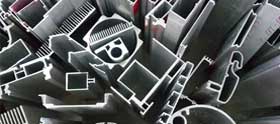Comprehensive knowledge of aluminum alloy profiles:
Aluminium profiles are aluminum materials with different cross-section shapes through hot melt and extrusion.The production process of aluminum profiles mainly consists of three processes: melting, extrusion and coloring (including: oxidation, electrophoretic coating, fluorine spraying, powder spraying, etc.).

The aluminum profiles are divided into:
1. Industrial aluminum profile: mainly used for airplanes, trains, industrial radiators, automobiles, electrical appliances, etc.
2. Aluminum alloy building profile: mainly used for building doors and Windows, curtain walls, indoor and outdoor decoration and architectural structure.
The aluminum profiles are divided into:
1. Anodized aluminum: the surface of the profile is oxidized by anodic oxidation, electrolytic coloring or organic coloring.
2. Electrophoresis coating aluminum: the surface of the profile is combined with anodic oxidation and electrophoresis.
3. Powder spraying aluminum: the surface of the profile is coated with thermosetting organic polymer powder.
4. Fluorocarbon paint spraying aluminum: the profile surface is coated with polyvinylidene fluoride paint.At present, the commonly used heat insulation profile is a kind of aluminum profile which adopts a strip or pouring compound.
Key indicators:
1. Appearance quality: the surface of anodized profile does not allow for the defects such as electric burn and peeling of oxide film;Electrophoresis, powder, fluorine carbon profile after the paint film should be uniform, clean, smooth, there is no wrinkle, crack, bubble, flow mark, inclusion and peeling paint film effects such as the use of defects, but within the scope of the profile end 80 mm allows local without membrane.The appearance quality of the aluminum alloy building profile affects the architectural decoration effect, so the surface of the factory profile must be coated to avoid surface scratch, collision and corrosion in the process of transportation and stacking.In the market, some aluminum alloy profiles have similar patterns of water striation and mildew, which reflect the defects of the production process.
2. Wall thickness: the wall thickness of the profile is one of the main factors affecting the strength of the workpiece. The main profile is the stressed part in the project.For example, the minimum nominal wall thickness of the outer window main profile shall not be less than 1.4mm.
3. Film thickness: extruded aluminum alloy profiles, whose surface corrosion resistance is not strong, the surface treatment should be carried out to increase the corrosion resistance, wear resistance and appearance aesthetics of aluminum.The film thickness of anodized aluminum material is divided into AA10, AA15, AA20, AA25, and the thickness of the electrophoretic coating aluminum film is divided into A.B.S, powder spraying aluminum decorative coating on the surface of the minimum local thickness of 40 or higher um, fluorocarbon spraying aluminum decorative paint on the surface of the layer thickness for coating of different kinds have different requirements, the second with the average film thickness acuity 30 um, three with the average film thickness 40 um, four or more with the average film thickness acuity 65 um.
4. Chemical composition and mechanical properties: the technical parameters of chemical composition and mechanical properties of aluminum alloy profiles are different, and the customer should check them one by one according to the standard (contract).
5. Color and color difference: there are differences in color and color difference between different brands and supply states.It is suggested that the influence of color and color difference on architectural structure should be taken into consideration when the alloy plate number and supply status are selected.
6. Anti-salt spray corrosion, abrasion, waiting and mortar, etc. : this is an important technical parameter of aluminum alloy profile, which reflects the properties of aluminum alloy profiles and influences the use.
All the above contents are arranged according to the problems encountered in the actual work of the students. For reference, please timely communicate and correct any questions.
